How Happy Can you be? – Part 1
In determining well-being of a person, happiness is key. As Aristotle said:
“Happiness is the meaning and the purpose of life, the whole aim and end of human existence.”
How happy one can be and to determine the kind of happiness one is seeking, the Moon and 4th house are to be considered. A good Moon is essential for emotional regulation. The mind is said to be in the 4th house of every horoscope and a lot can be said of our formative years looking at the 4th house. There is psychological research (Mary Ainsworth) to show that our upbringing in the early years makes a huge difference in our capacity to be happy and how we relate to others. Insecurity experienced in early years results in us being excessively clingy or avoidant in relationships. However our upbringing maybe, we all have a story or a script (Eric Berne) in life and it keeps playing in our heads while dealing with the present. Our brains get configured to reinforcing our script by actively looking for events that validate it.
Friendships are important part of well-being and happiness. Aristotle has claimed that persons who are insecure will not be able to make deep psychological bonds symbolised by character friendships that foster growth and evolution; and instead focus on friends of value that are transaction based. They find happiness elusive or are unaware of the deeper emotional bonds with people. The point to note is the psychological closeness signified by friendships are different from attachment to family.
In a horoscope, we ascertain the nature of the mind and the potential for being happy from the
-
-
- The 4th house and its condition and the planets in it
- Trines to the 4th house as planets in trines influence
and help each other. - Moon as the karakā for the 4th house
- Placement of the 4th Lord
-
Concept of Happiness
Before we look into the astrological points, let’s look at what really constitutes happiness from the Vedic spiritual texts as there are many fallacies associated with the common definition and experience of happiness. Most of us are content seeking happiness eternally instead of seeking eternal happiness.
Firstly, the successful fulfilment of the needs or desires of a person is usually construed as happiness. Svāmi Cinmayānandā had defined happiness as the quotient of
Desires fulfilled/ Desires created
It follows from this definition that the process of fulfilment of desires is quite illusionary as in reality as soon as one need is satisfied, another one takes its place in our minds, increasing the denominator of desires created thereby reducing the quotient of happiness. One can observe this in daily life – we travel to a new country and experience joy and then when we are back, a bucket list of countries to go to is made leaving us with a longer list of things to do and more anxious to get away again.
We are programmed to achieve and to attain security or happiness. Life becomes the endless goal of acquiring things and making efforts to secure it. This process is called ‘Yoga-kṣema’. Yoga is acquisition of things one does not have and kṣema is protecting all that we have. Endless acquisition of things creates attachment that binds us further and there is no contentment.
The second issue with enjoying happiness is to deal with the concept of duality (dvanda). To experience happiness, we have to equally experience sorrow as these attributes cannot be defined, enjoyed or possessed without the other. Being human, we cannot get away from the experiences of polarities such as joy and sorrow or success and failure.
Thirdly, we always think that happiness is something external to us, in acquiring something or possessing. Most spiritual texts advise us that happiness exists within ourselves and this is the purest and highest form of happiness. We do not understand that when we are really happy, we experience our unadulterated core. However, we mistake our identity with that of our body, mind and the senses, then we go about seeking happiness for the sake of satisfying our body and insecure mind and senses.
Taitreeya Upaniṣad describes progressive enhancement of state of material happiness by indulging with the senses. When I see a picture of a mango, as my mind dwells on it and there is a simple joy in thinking about it. This is termed as ‘priya’. Then, I find ways and means of acquiring it and when it does reach my hands – the pleasure or state of happiness in physically holding the mango is called ‘moda’. As I finally I place it in my mouth and taste it, the experience of joy is maximum called ‘pramoda’. The joy is enhanced at every stage as the distance between the object desired is progressively reduced. All three forms are temporary states.
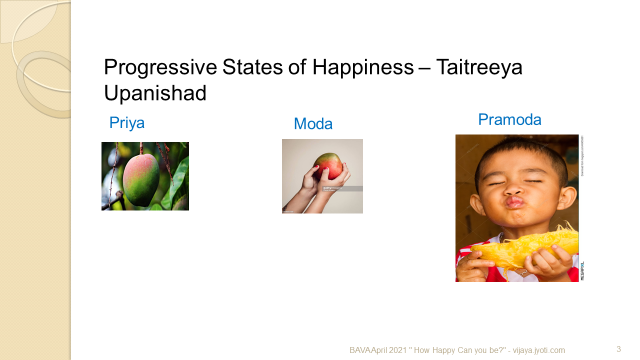
In contrast, Sri Kṛṣṇa in Bhagavad Gītā in Chapter 3.17 explains that the progression of eternal happiness should be from
“Ātma-ratiḥ — self-rejoicing to ātma-tṛiptaḥ— satisfied in self and to ātma santuṣhṭaḥ –contentment in self”.
When one reaches the state of self-dependence, then one does not need to acquire anything from the world to fulfil ourselves. One can merely be happy unconditionally. To be truly happy one has to reduce the dependency on the objects of the world.
So how can try to attain this wisdom?
Yama, the God of Death in conversation with a young brahmin boy Nachiketa explains in Kaṭhopaniṣad that there are two paths available for humans – the path of good (śreyas) and the path of pleasant (preyas). The path of the good is an introverted part, here we take the inner path of understanding ourselves and our reaction to the external world, while finding ways to transform ourselves. This is the nature of a spiritual person. The path of pleasant is easier but it is a material path where we are extroverted in nature. Our mind and senses are connected to objects that are external to us, we define and value ourselves and our happiness by what we possess. We try to transform our surroundings to suit us. Lord Yama says it is only the wise ones that are able to choose the path of good as others get bound by avarice and attachment.
Examining the Potential for Happiness – the 4th house and its trines
The 4th house shows our earliest experiences in life and it signifies our learning, welfare of mother, happiness, sweet-smelling substances, kin, relations, mental attributes, vehicles, lands and houses. It is called a sukha bhava or house of happiness as all these attributes or objects listed can be construed as bringing us happiness. The karakā for each of these things are different. The karakā for mother, mind and happiness is the Moon. The 4th house and the planets in it show what we desire to possess in this life. How we are prepared to achieve them is shown by the 4th lord. The planet placed 4th from the ascendant lord captures our intellect. Using the bhavāt bhavaṁ concept the 4th from the 4th lord is what we are so happy to protect at any cost. It is what binds us in life. The 4th house represents debts or unfinished issues from past life as it is the 8th from the 9th house of past life.
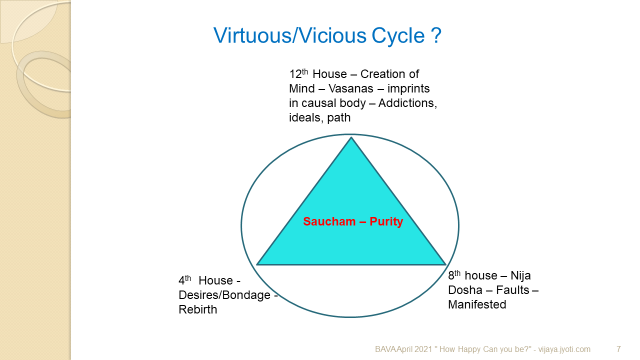
The mind is created from the oceans of the 12thhouse being the 9th house from the 4th house. The 12th house is where our deepest desires are stored which are called vāsana or deep imprints that cause behavioural patterns. It is also the dharma of the 4th house as it the 9th house from it, hence the planets in the 12th have a significant influence on happiness and propel us to act to satisfy the 4th house. 12th house also signifies the feet of the kālapuruśa (Cosmic Man) and indicates the gati or path we are inclined to take to achieve happiness. This gati is dependent on our guṇa (nature) as well as the circumstances we have to face in our life as per prārabdha karma (definite, destined karma to be faced).
The 8th house represents our mistakes and past debts we carried over in life or incurred while went about feeding our desires. It is from this house, we can exhaust the balances of the 12th house as the 8th house is the dharma of the 12th house (as it is 9th from the 12th house). Planets in the 8th are very harsh and demand that we pay the debt. They can stop functioning of planets in the 12th and hence control our notion of happiness coming from the 4th house.
This way the moksha triangle (4-8 and 12 houses) continuously feed each other while working together to keep us in the vicious cycle of samsara and rebirth.
It is important to note that this triangle also represents the jala tattva (water element) which controls the taste and memory function. Thus, with the help of this triangle and the planets in them, our script is kept alive by indulging our tastes and delving into our past memories and reacting to the present.
Planets in the 4th house
The 4th house is focal point in this triangle and it is the house of Viṣṇu and signifies purity. Therefore it goes without saying that more benefic planets are welcome here for a balanced mind and happiness than the malefic ones which can give us misery. Jātaka Pārijāta lists the effects of the 4th bhava to include manoguṇāni (मनोगुणणि).
The literal definition of guṇa is “a single thread or strand of a cord or twine”-or that which binds. From the Bhagavad Gītā, the material universe is balance of three guṇas – Sattva, Rajas and Tamas. Sattva guṇa is the mode of goodness, pure, illuminating and binds the soul by creating attachment for to happiness and knowledge. Rajas guṇa arises from worldly desires and affections, and binds the soul through attachment to furtive actions. Tamas guṇa is born of ignorance and deludes all living beings through negligence, laziness, and sleep and causes the soul to be trapped in illusion.
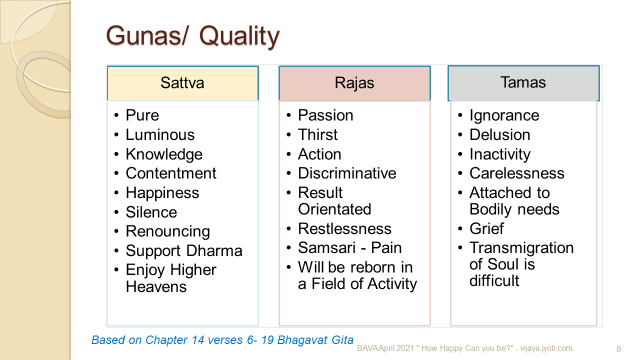
The guṇas are made up of experiences from this life and past lives, as well as from circumstances both external and internal (which includes our body and senses) and are usually acted upon in daily life by our identity (ahaṅkāra). On the death of the human being, it is said that while the gross body drops, the causal and subtle body including our mind, memories, experiences and habits travels along with the individual soul to the next destination to be exhausted and experienced in the next life. This is why we are so bound by her past experiences that it very difficult for us to change habits or thought patterns.
It is important to note that the Vedic thought does not subscribe to our script starting in the experiences of the 4th house with our primary carer but in the 12th house where the mind is created and where our deep desires and inherent thought patterns (vāsana) from previous lives are stored.
So which are the planets that can help us to attain equanimity?
The sattva guṇa planets are Sun, Moon and Jupiter, Rajas guṇa planets are Mercury and Venus and tamas guṇa ones are Mars, Saturn, Rahu and Ketu. The presence of sattva guṇa planets in the 4th house bind us to purity and knowledge making it easier for us to evolve, whereas rajas guṇa planets bind us to passion, achievement and attachment, thereby curtailing spiritual improvement. The tamas guṇa planets can make one indolent and careless, they make us fall spiritually.
The water element planets (jala) Moon and Venus do well very well in the trines to the 4th house, however can give some addiction and indulgence. Moon in the 8th is not favourable. The fire planets (agni) Sun, Mars and Ketu do not do well in the 4th house and trines. Ketu is acceptable in the 12th for the purposes of liberation. They are enemies to the water element and are not conducive to peace. They can deny the fruits of the house. The wind element planets (vāyu) Saturn and Rahu are neutral to the water element, but bring about suffering. Saturn in the 8th can give longevity but suffering comes with a long life. The earth element planet Mercury is a friend of water element and hence promotes learning and respect. Jupiter represents the space element and excels in the 4th but suffers in 8th and 12th due its neutrality with significator Saturn.
Moon as the karakā of the 4th house
Moon is mind and is termed as citta in Jātaka Pārijāta. Moon is the karakā for the 4th house and attains directional strength in the 4th house. The digpala devata that manifests when Moon is in the 4th house is Maruta (vāyu) denoting strength both mental and emotional. It is the mind that illuminates the experiences and objects by placing focus on the five sense organs. Mind alone experiences pleasure at a particular time, pleasure is a mental experience. If the mind fluctuates, the experience fluctuates.
The Moon is considered afflicted when placed in dusthanas – evil houses 6th, 8th or 12th house or in the company of malefic planets such as Mars, Rahu and Saturn. When the Moon is afflicted, there could be some delusion in thinking or a reaction in the form of a denial or a defence or projection making it difficult to introspect or relate to others properly. To make a final judgement, one should look at the placement and condition of the dispositor of the Moon as this planet brings us closer to our desires.
In Kaṭhopaniṣad, the body is compared to chariot and the mind as the reigns to the five horses which are the five elements and senses. The reigns should be tight and can be controlled by the charioteer who is the higher intellect to reach the destination otherwise one can run amok or pulled by the five horses (sense organs) in different directions and lose sight of the goal.
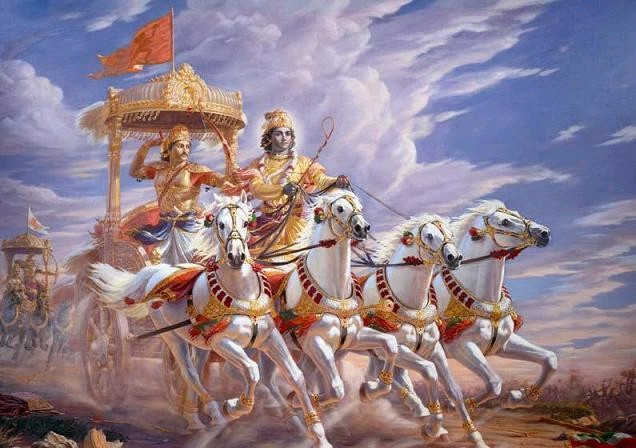
आत्मानँ रथितं विद्धि शरीरँ रथमेव तु ।
बुद्धिं तु सारथिं विद्धि मनः प्रग्रहमेव च ॥ ३ ॥
Know the ātman as the lord of the chariot who sits within it, the body as the chariot, know that intellect as the driver; know the minds as the reins.
इन्द्रियाणि हयानाहुर्विषयाँ स्तेषु गोचरान् ।
आत्मेन्द्रियमनोयुक्तं भोक्तेत्याहुर्मनीषिणः ॥ ४ ॥
The senses, they say, are the horses; the objects which they perceive, the road; the atman. The wise call the ātman the enjoyer when he is united with the senses and the mind combined.
विज्ञानसारथिर्यस्तु मनःप्रग्रहवान्नरः ।
सोऽध्वनः पारमाप्नोति तद्विष्णोः परमं पदम् ॥ ९ ॥
The man who has a discriminating intellect for the driver and a controlled mind for the reins, reaches the end of the road, i.e., that highest place of Viṣṇu.
It follows that a benefic planet in the ascendant is favourable as it can reign in the mind, especially when it is Jupiter or Mercury that have directional strength in the ascendant. Jupiter represents wisdom and Mercury is application of intelligence. Before arriving at conclusions about the intelligence of a person, one should always look at placement of these two planets.
4th lord and its placement
The 4th lord has the job of procuring all that is desired. A malefic 4th lord will fight for happiness whereas a benefic 4th lord is more accepting. An exalted 4th lord has the energy of Viṣṇu – purity and sustenance; hence will promote high ideals while the reverse is true for a debilitated 4th lord. The 4th lord in dusthanas (evil houses) of 6th, 8th and 12th houses does not bode well for happiness. It is also worth noting the placement of the karakā Moon from the 4th lord as it signifies whether divinity will favour the effort of the 4th lord.
References
-
- My Jyotish Guru Pandit Sanjay Rath’s teachings
- Jātaka Pārijāta Chapter 12
- BV Raman -How to Judge a Horoscope
- Svāmi Paramārthananda’s (Arsha Vidya) teachings on Bhagavad Gītā and Kaṭhopaniṣad
- Ainsworth, M. D. S., & Bell, S. M. – Child Development, 41(1), 49–67.
- Aristotle in the Moral Self by Pauline Chazan
- Eric Berne -What do you say after you say hello? – The psychology of human destiny
- Daniel Siegel – Mindsight- the new science of personal transformation
Part 2 to follow with examples…………
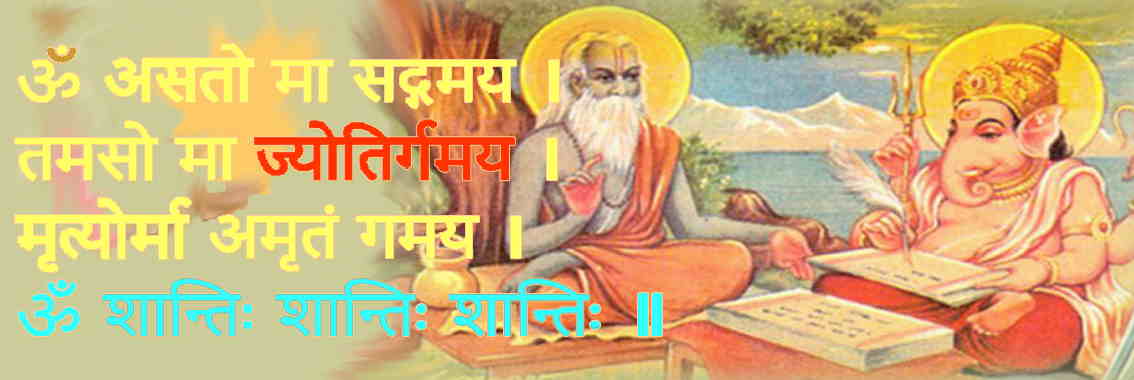

Superb , thanks